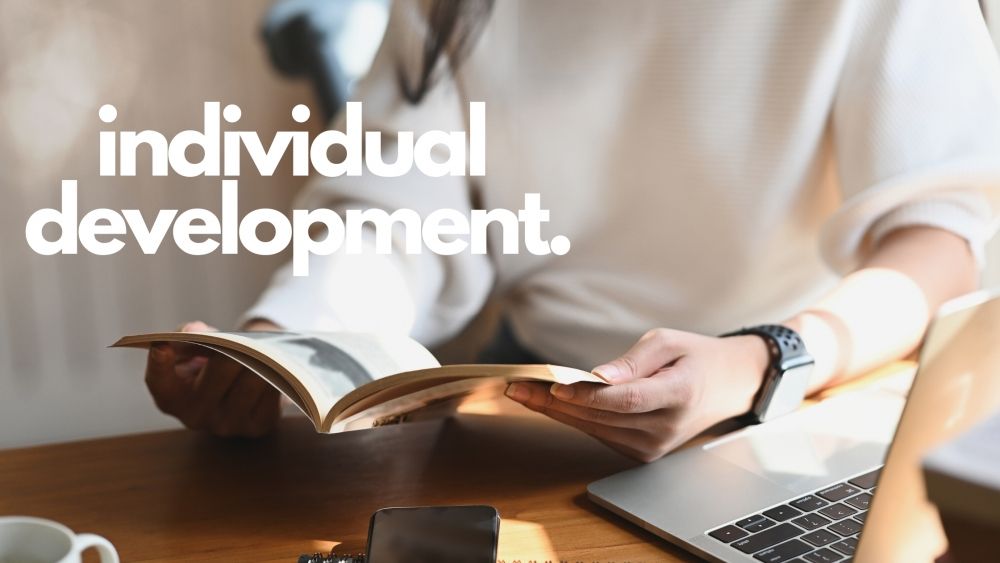When you see the words “individual development” or “personal development”, where does your mind go? Does it go to ‘Make myself better at work’ or perhaps ‘Why would I’? or somewhere in between. Learning is something your Learning and Development (L&D) team love and is committed to supporting you with.
Some people don’t see a reason to grow, while others are seeking continuous improvement. Is one better than the other? It depends on whose perspective you are looking from and for whom you are improving. If you aren’t doing it for you first and foremost, why not? Is it out of obligation or ‘because I should’?
Self-Awareness
Self-awareness is the first step. Hang on – why not skills? Skills matter but to approach skills before you know you better is a waste of energy.
How aware are you of yourself? What do you like to do? Your strengths and also the tasks which sap your energy. Are you aware of your emotions and how they impact on you and others as well as other people’s emotions (Emotional Intelligence or EQ)? What makes you tick? Am I being authentic or am I living to someone else’s expectations – that is so exhausting!
“Know Thyself”
This phrase has been used since the ancient Greek philosophers, etched on buildings and expanded on. The temptation is to learn about others because learning about yourself means vulnerability. The truth is, you can’t go where you want to go without knowing what drives you. Then you can position your work or even your role in line with you; you can understand better how to energise yourself and understand the energy sappers.
According to renowned psychologist, Carl Rogers:
“We want to feel, experience and behave in ways which are consistent with our self-image and which reflect what we would like to be like, our ideal-self.” 1
Save your energy! What do I mean? If you have to be the person you are not to impress someone or to do a role, then you will exhaust yourself. Raising self-awareness and aligning your behaviour or tasks will not only remove the energy-sapping activity but will place you where you are aligned with the activity (behaviour or task/role) which will be energizing. When this occurs, you have congruence.
In terms of your work role, awareness of yourself must precede true satisfaction in your work role in the long term because your values and preferences will be in line with what you do for a third of you day. Trying to find a role and making yourself fit it probably will have short-term success only and you might fluke long-term success and fulfillment. And the great news for the organisation you work for is they will have the right person in the right role, which is good for everyone. Here’s the kicker – people will get to know the true you, like you (or perhaps not, which is good news) for you and you won’t have to change their opinion should you ever decide to be congruent in the future AND you’ll respect you more too.
Is raising your own self-awareness what you want to do? The L&D team can support this through training and coaching. There are a suite of possibilities.
Self-Acceptance
You’re now more self-aware, which is great, but what if you don’t accept you. That’s tough to discover and work through. We live in a world where there’s a comparison trap. We often overvalue what we don’t have and undervalue what we do. This quote say it well:
“Compare yourself to who you were yesterday, not to who someone else is today” – Prof. Jordan Peterson
Learning professionals support you to allow for the discovery and the processing of your new learning.
Skill Development
Most people start here – skill development and they assume they are developing skills for purposes that actually suit them. They can’t possibly imagine then that the role they are in is not as a result of conscious decision making. Who is to say that at a point in the past, someone said to them, “You know what role you’d be great at…
This is why we start with self-awareness and then self-acceptance – we learn our values, the things which energise us, our natural inclinations from nature and nurture in terms of work preferences or personality etc, then once we’ve anchored these, we develop skills or education as appropriate.
If you’re in the role where your self-awareness and conscious choice has taken you, then develop skills which improve your success and enjoy-ability of your role. Understand the base-level attributes which your role dictates. Perhaps the National Capabilities Framework can assist with this. Choose wisely – you may want to be a whiz using MS Excel but communication skills are an identified gap. Also, look towards roles which would continue to stretch you and the skills or educations required.
If you’re in a role which after consciously considering your preferences and deciding that you’re working where someone else prefers, set your new goals, attain the education and/or skills and set the path. Coaching will assist as well as time with a manager who is in tune with this thinking. Remember,
If you don’t decide what you want to be, someone else will decide what they want you to be.
So, don’t rest and wait for someone to offer you learning or wait for your manager to be responsible for all that you’re meant to become. Take responsibility for your Individual Development. There are many resources to support you. You could develop with your coach or with your manager a Development Plan.
Your team of Learning and Development Specialists will support you to learn with a vast array of courses offered by Eva Burrows College, under which the Learning and Development Team sits. We have access to external courses also.
1 McLeod, S. A. (2014, February 05). Carl Rogers. Simply Psychology. https://www.simplypsychology.org/carl-rogers.html
